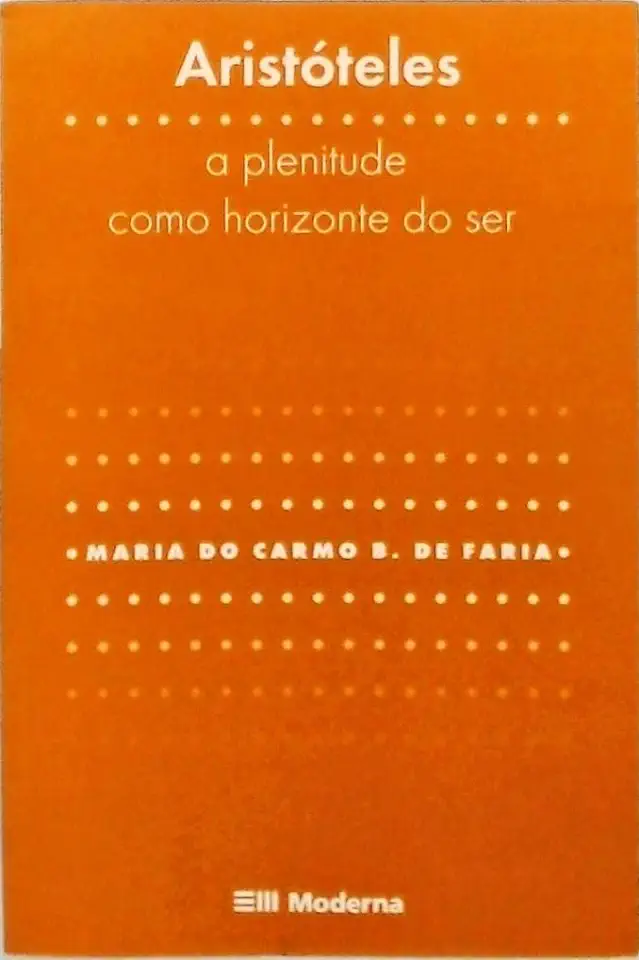
Aristotle the Fullness as the Horizon of Being - Maria do Carmo Bettencourt de Faria
Aristotle: The Fullness as the Horizon of Being
In her book "Aristotle: The Fullness as the Horizon of Being," Maria do Carmo Bettencourt de Faria offers a comprehensive and insightful exploration of Aristotle's philosophy, focusing on the concept of fullness as the ultimate horizon of being. With meticulous scholarship and engaging prose, Faria delves into the depths of Aristotelian thought, providing a fresh perspective that sheds new light on one of the most influential philosophers in Western history.
A Journey into Aristotelian Philosophy
Faria begins by introducing readers to the fundamental principles of Aristotle's philosophy, emphasizing his emphasis on the natural world and his systematic approach to understanding reality. She argues that Aristotle's philosophy is not merely a collection of abstract ideas but a dynamic and holistic framework for comprehending the universe and our place within it.
The Concept of Fullness
At the heart of Aristotle's philosophy lies the concept of fullness, which Faria identifies as the ultimate horizon of being. Fullness, according to Aristotle, is the state of complete actuality, the realization of a thing's potential, and the ultimate goal of all natural processes. Faria explores the various dimensions of fullness, from its metaphysical foundations to its ethical and political implications.
Metaphysical Foundations of Fullness
Faria delves into the metaphysical underpinnings of fullness, examining Aristotle's concept of substance, form, and matter. She argues that fullness is not simply the accumulation of matter but the realization of a thing's essential form, the actualization of its potential. Through a close analysis of Aristotle's texts, Faria demonstrates how fullness is the ultimate principle of intelligibility and the foundation of all reality.
Ethical and Political Implications of Fullness
Faria goes beyond the metaphysical realm to explore the ethical and political implications of fullness. She argues that fullness is not only a cosmic principle but also a moral imperative, guiding human actions and shaping human communities. Faria examines Aristotle's ethical theory, emphasizing the importance of virtue, the pursuit of happiness, and the role of contemplation in achieving fullness. She also explores Aristotle's political philosophy, highlighting the significance of justice, the common good, and the role of the state in facilitating human flourishing.
Aristotle's Legacy and Contemporary Relevance
Faria concludes by reflecting on Aristotle's enduring legacy and the relevance of his philosophy to contemporary thought. She argues that Aristotle's concept of fullness offers a profound and timeless framework for understanding the world and our place within it. Faria invites readers to engage with Aristotle's philosophy, not as a mere historical artifact, but as a living source of wisdom and inspiration that can enrich our understanding of reality and guide us towards a more fulfilling existence.
Why You Should Read This Book
"Aristotle: The Fullness as the Horizon of Being" is a must-read for anyone interested in philosophy, metaphysics, ethics, or political theory. Faria's masterful exploration of Aristotle's philosophy provides a deep and comprehensive understanding of one of the greatest minds in Western thought. With its engaging writing style, meticulous scholarship, and profound insights, this book is an invaluable resource for scholars, students, and anyone seeking to expand their intellectual horizons.
Join Maria do Carmo Bettencourt de Faria on a journey into the depths of Aristotelian philosophy and discover the transformative power of fullness as the horizon of being.
Enjoyed the summary? Discover all the details and take your reading to the next level — [click here to view the book on Amazon!]